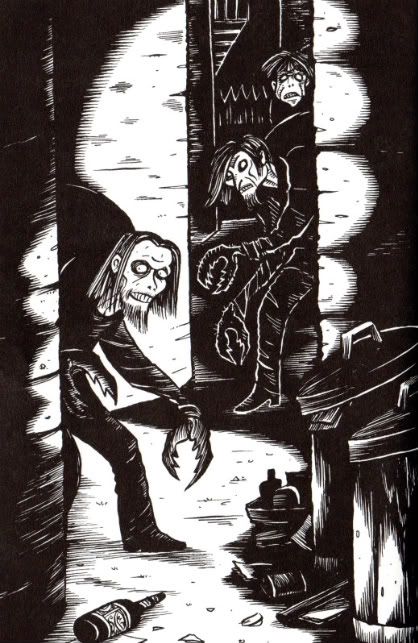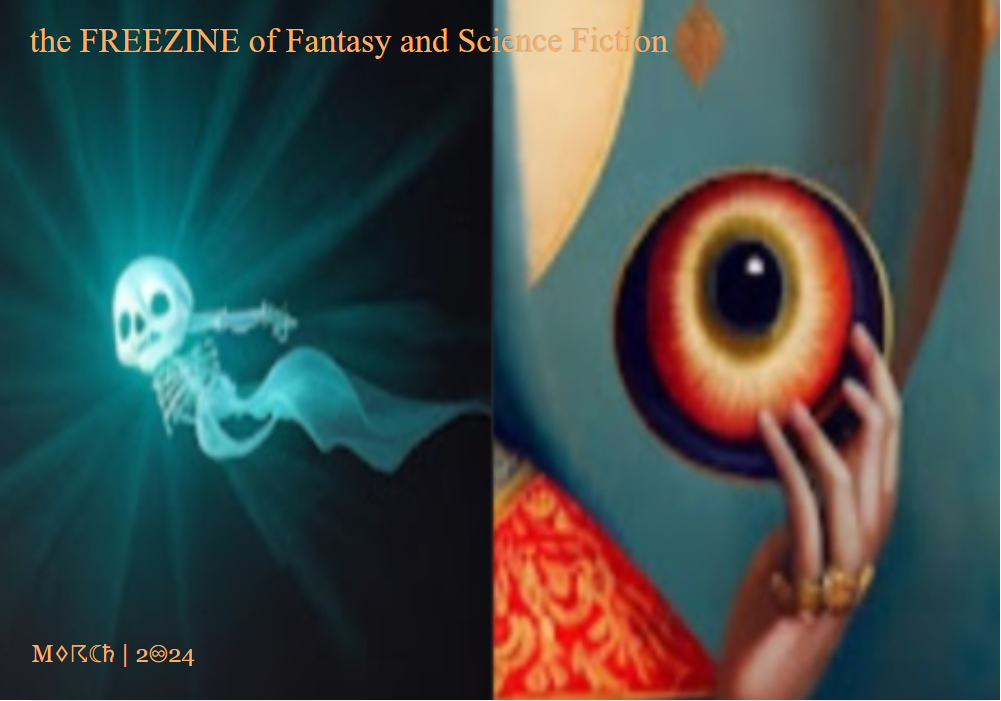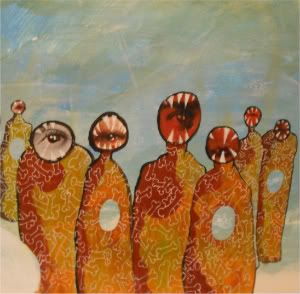illustration by Richard Sala

How had Lester become homeless? It seemed that one day he just was. But, of course, it wasn’t like that at all. There were significant incidents that led up to it. First, there was the loss of his job. Second, the end of his five-year relationship with Bobby. Depression followed and then the gradual draining of his bank account. Finally, the loss of his apartment. He stayed with friends for a while, then got a room with some money that came in from the sale of his deceased mother’s small diamond ring. But one day soon thereafter, he awoke to find that his options had all run out. He spent a rough week at a shelter, then was turned away even from there. He was told he could return in three days but he’d vowed that he would not. It had been a nightmare of disgusting smells, the ever-present possibility of being attacked while asleep, and an uncomfortable cot in a room filled with other men farting, coughing, screaming––and worse.
He was too embarrassed to ask friends for the use of their showers and couches anymore and his appearance was deteriorating to the point where he didn’t even want them to see him. There had already been some incidents when he’d spotted people he knew and turned away. He felt he’d never really known desolation and loneliness until now and the streets, the city, and everything about it were frightening. But strangely, he felt more aware of himself, and his senses, although raw, were roused to a higher state now that his basic survival was at stake.
Lester was a budding underground comic artist, and his dream was to create a comic book on his own and sell it to a publisher. Six months before, he’d begun the comic, which ironically he’d called: The Homeless Mutants. “HOMELESS PEOPLE TURNING INTO MUTANTS,” a piece in the Weekly World News, had sparked his imagination and he’d decided to use it as a jumping-off point. He still carried the clipping in his wallet. The extravagantly lurid subtitle of the Weekly read: “MILLIONS OF STREET DWELLERS MORPHING INTO CREATURES WITH HUGE EYES--AND CLAWS!” Lester had completed only a few panels of preliminary sketches and then couldn’t seem to find the time to get back to it. But he hadn’t forgotten it, either, and now, at this low point, he began thinking about the comic book again.
The article described the mutants as having developed humped backs from dumpster diving, a dog’s acute sense of hearing, tough reptilian skin, and highly-developed immunity to viruses and germs. It had been fun drawing the mutants from the descriptions. He’d had a pack of them slinking through back alleys. Then he’d worked on the startled expressions of pedestrians as they caught a glimpse of them. Of course, Lester had seen no mutants since he’d been on the street, although he did see some frightening human specimens.
There were some choice characters amongst his new acquaintances who had chosen to hang around the same part of town. Willy, for one, was a man who wore pants to fit a man twice his size and sneakers so large that he looked like a filthy clown bum.
Lee, a Chinese fellow with bushy, black hair, pushed his shopping cart around the block in an endless circle, only resting for a few hours in the morning while leaning on his cart. Lee carried stacks of notebooks that he filled with figures and symbols that only he could decipher. They looked as though they might have had some connection to a lost, ancient language or maybe an extraterrestrial origin, Lester mused. He worked on them while he slowly pushed and steered the cart with his body. He always seemed to be working on some monumental problem. Then again, Lee counted on his fingers, so could he really be working on a level that was all that advanced?
Mr. Dicker, another character, was blind and today Lester spotted him sitting on an abandoned red and white couch on the sidewalk, eating some slop off a paper plate, as content as if he would be sitting in his own home. The couch was horribly stained and missing cushions, but its pattern of huge red flowers imbued a festive mood around Mr. Dicker, who was unshaven and chewing a mouthful of mush thoughtfully. A new neighbor, nameless thus far, was a boy with long hair who was wrapped in a blanket, Indian pow wow style, holding out a plastic cup for money.
Today, Lester found an entire box of exceptionally good paper thrown out in an alley. He’d come by some nice pens and pencils the same way at a recent dumpster feast where he’d also scored a pillow and some toothpaste. Now, when the sun came up, he’d go back to “his” spot behind an abandoned building where he would climb up to the landing and draw. Though he could begin the same comic from memory, he now added his daily observations and experiences.
He was fast at work, smoking a hand-rolled cigarette and sipping from a canteen, when he heard a woman’s voice.
“Excuse me, young man.”
Lester looked down to see a middle-aged woman wearing a thermal parka and a fur-lined hat. She held a clipboard in front of her. That parka would be nice for this weather, Lester was thinking.
“Yeah?”
“Would you like to come tonight and have a big bowl of curry and rice? Even a salad and warm corn bread and real butter.”
The words alone made Lester’s mouth water and his stomach growl and grumble as he felt it awaken and demand to be fed. Lester put his drawing aside and came down the few steps to meet this brave humanitarian. She was a tiny woman. She handed him a coupon and had him spell out his last name, which she added to a list on the clipboard.
“Do you know this address?” she asked, pointing to his coupon with her pen.
“Sure do, ma’am. I’ll be there at six. Thank you kindly.” He had never used “ma’am” before and, to his recollection, had never said “thank you kindly” either. She said goodbye and walked off in search of another soul. Again, he was impressed with her fearlessness, wandering these back alleys of skid row.
At six o’clock, Lester arrived at the “Bowl O' Curry Vigil” at the address on the coupon. On the door of the old hall was an orange and white banner: “Homelessness and Hunger Awareness Week.”
Inside, Lester was soon nearly swooning over his bowl of curry and rice and chunk of cornbread. The hall was almost filled with other street people sitting at wooden tables and scarfing down the food. In the back were various agencies’ booths that offered help and services to the homeless. On a stage, a thin man in suspenders and dark glasses was speaking into a microphone.
"People have an image of what a homeless person should be. I didn't fit any of the descriptions. I came from a wealthy family in Kankakee, Illinois. I attended university in Decatur. But there I discovered alcohol. One day I got a notice that said I had thirty days to move."
The man stopped for a sip of water. "I was forced to live between motels and friends' homes––and being codependent for my alcoholic girlfriend. I didn't want to live in my car, but that’s where I was heading. Then I was approached by some people here, and now I have a job and a room.”
Some gathered in the eating party grumbled and others snorted and coughed.
“Scott Henderson,” who looked like a construction worker, spoke next. He had grown up in a poor family and had ended up homeless. "I used to be depressed,” he said. “And I thought of suicide. Over the years, I’ve been in and out of homelessness, but now I’m a staff worker at a shelter.” Henderson stopped to survey his audience.
"So many people don't worry about the future,” he scolded. “And there are many people you’d never expect to be homeless who arrive at the shelter."
Yeah, alright already, so what, Lester thought, finishing off his salad.
“One of the common misconceptions about the homeless is that they’re too lazy to work,” Henderson said. “People need to take into account the possibility that these men and women could have mental or physical disorders that prevent them from obtaining available jobs.”
Henderson told the story of a man at the shelter who had “Reflex Sympathetic Dystrophy,” which caused muscle deterioration. “Because this disease had not been researched in depth, he wasn’t eligible for any disability checks and had to find other ways to pay for treatment. When he couldn’t afford the pills, a pharmacist offered him a container with fewer pills for a reduced price, but each pill would cost more.” Henderson made a grimace of disgust. "Price gouging is just unacceptable,” he said.
“I have seen three homeless deaths in the past year,” said “Jake,” a wizened old codger. “One of my homeless friends was found frozen behind a dumpster. He crawled between the dumpster and a concrete wall to stay warm. It was twenty below zero that night. He went back there thinking that hot grease from the restaurant was going to be dumped and the heat from the grease would get him warm. But there was no grease that night. They had to scrape his frozen body from the concrete.
"The other death was in the heat of summer,” Jake continued. “The man was quite old, and had become homeless after the death of his wife. He carried a bag for his body waste. He used to tell me that he couldn’t wait for death, so that he wouldn’t be homeless anymore. They found him dead on the steps of a church. He is no longer homeless.
“Another man, one of my best friends, used to sleep on a pad near me. He was a heavy drinker. He said he could get the warmth he needed from the bottle. He would get so drunk that nothing else mattered. He stole to eat, at times. And he got caught for it. But jail was only a place to stay for a night or two. He began sleeping in a homemade tent that he hid near the railroad tracks. Well, one night, he never made it back to the tent. He got run over by a train. So I ask you, when will people really help to stop the madness?” Jake had run over his time and was escorted off the stage by one of the staff.
Another staff member, a fat hippie wearing a Nirvana T-shirt, now spoke to the captive and apathetic crowd in the old hall that smelled of stale clothes and curry. It all started to sound like babble to Lester, who was feeling downright drowsy after the meal, but he pretended to listen attentively.
“Homeless here are being banned from places that have been used as camps in the past,” the hippie stated. “Granted, there are health concerns, but we’re not being given any viable options. The shelters are maxed out. There used to be a car camp every winter that had staff from local services onsite and a liaison officer from the police department. Bathrooms and shower facilities were provided. Not anymore. Every night, large buildings all over town with bathroom and kitchen facilities go empty. Community resources are overloaded. And huge churches are empty most of the time, but won't open facilities to the homeless because of insurance, lack of volunteers, expense, liability, etc. There are many large commercial as well as government-owned buildings that are empty, too. It’s the season of tragedy, and this winter is looking particularly grim. It feels like we're waiting for a slaughter. It's unimaginable and we’re here to try and stop that.”
Although it was warm inside, the talk was starting to bore Lester and give him a slight headache so he got up to leave. He was stopped at the door by different workers wanting him to sign petitions and fill out questionnaires. He told them he was just stepping out for a cigarette and that he’d be right back. Outside, he quickly crossed the street and turned a corner. He leaned at a stoop and lit up a hand-rolled cigarette. The meal had been a godsend. The only other food he’d had all day was an Egg McMuffin, a coffee, and a stolen apple that was too sour for his taste––though he'd eaten it anyhow. Now he would go back to his landing, in the hope that someone else hadn’t tried to stake a claim. It was a nice spot that got the daytime sun and was partially sheltered from the wind and rain. As he smoked, he noticed a group of men coming down the street toward him. As they approached, he saw that they were Chinese youths wearing oversized rapper or gang–type clothes––Lester had no idea which. They were swaggering and Lester looked away, wanting to avoid any eye contact.
“The fuck you lookin’ at, bitch?” one of them taunted, apparently trying to sound gangsta.
Lester still looked away but with escalating dread, knowing that they had stopped.
“Don’t fuckin’ ignore me, scumbag.”
They were all laughing now like sick hyenas. Lester turned to find the four moving from side to side in a menacing dance. Lester looked around frantically: Where was anybody? The street he’d picked to stop on was completely deserted.
“Please leave me alone,” Lester pleaded.
But the four, one by one, flicked open knives that glittered under the light of the street lamps. Lester saw the oft–described life–flash, saw his death, and then saw something else: climbing down a wall across the dim street were three figures with hunched backs––three deformed ninjas.
“I-I was looking at them,” Lester said, staring beyond the thugs at the approaching mutants. Yes, that’s what they were: mutants. Their eyes were wide and gave off a pinkish light. Their hands were oversized claws and they were coming for the gang. When the thugs saw them, their expressions of idiot hatred and stupidity turned to confusion, then terror. They began to scream, but their screams were cut short as the mutants were on them slicing and hacking like manic butchers in a sped–up film. The claws were multifunctional: razors, scissors and cleavers. In moments, they’d begun to feast on the dead flesh. The leader turned to Lester and gestured that he should go.
Lester walked off as fast as he could, his legs and body still shaking. As he was making his way back to the landing, he spotted Lee coming toward him with his overpacked shopping cart. Lee stopped and stared at Lester, wide–eyed. He pointed to his notebook and then at Lester and started yelling in Chinese. Lester hurried away. Once he made it to his landing, he bundled up and got the cardboard arranged around himself.
Then he heard a shriek and looked out to see the mutant leader crouching near him and smiling. He was holding Lester’s sketchbook and nodding appreciatively. Lester found the creature’s eyes oddly compelling now. His skin, close up, was like smooth, fine leather.
“Come Lester,” he said gently. “You can be like us. No need to sleep out here like an animal.
“Come, I’ll take you Underneath.”
JAN ISSUE
Click Here
Click Here























No comments:
Post a Comment